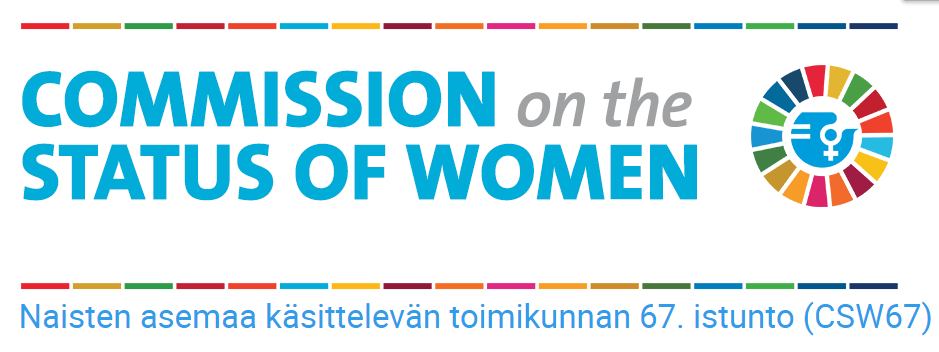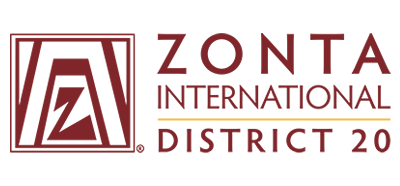Katso Zonta Internationalin CSW67 tapahtumat tästä!


Are you ready for the 67th session of the Commission on the Status of Women (CSW)?
Whether in-person or virtually, join us for CSW67 from 6-17 March with the priority theme, “innovation and technological change, and education in the digital age for achieving gender equality and the empowerment of all women and girls.”
Zonta International Statement to the
67th Session of the Commission on the Status of Women
Zonta International, a leading global organization of more than 26,000 professionals in 62 countries working to build a better world for women and girls, presents to the 67th Session of the United Nations Commission on the Status of Women the following statement for consideration of the Commission in its deliberations on innovation, technological change and education in the digital age for achieving gender equality and the empowerment of all women and girls.
Achieving gender equality and the empowerment of women and girls is critical to achieving all 17 goals laid out in the 2030 Agenda for Sustainable Development; however, widespread access to information and communication technology are also vitally important to achieving the SDGs and realizing gender equality. The United Nations General Assembly, in reference to the 2030 Agenda, stated that, “the spread of information and communications technology and global interconnectedness has great potential to accelerate human progress, to bridge the digital divide and to develop knowledge societies.”
The importance of information and communications technology is even more essential today, as the COVID-19 pandemic has transformed the way we learn, work and interact with others on a daily basis. While the COVID-19 crisis reinforced the growth and impact of the digital economy, the United Nations said it has also “laid bare and exacerbated the growing digital divide within, between and across developed and developing countries, particularly in terms of the availability, affordability and use of information [and communications technology] (ICT) and access to the internet, deepening existing inequalities.”
According to the International Telecommunication Union, the United Nations specialized agency for information and communication technologies, 2.9 billion people still do not have access to the internet, including four out of every five women in the least developed countries. According to UNESCO, more than 1.3 billion children, age three to 17, do not have access to the internet in their homes and are, therefore, cut off from the resources, information and opportunities that connectivity provides.
The rapid increase in the use of digital tools has also brought greater attention to the gender digital divide, the gap between men with access to the internet (62%) compared to women with access to the internet (57%). Owning a smartphone and access to the mobile internet is now essential to accessing financial, healthcare and educational resources, yet women are 18% less likely to own a smartphone than men, according to the International Telecommunication Union. Data on the gender differences in internet usage by children under the age of 18 is not as readily available; however, UNICEF reports that in countries with data, girls aged 15–19 years were less likely than boys to have used the internet and they also had lower mobile phone ownership. This gender digital divide holds women and girls back from freely and fully participating in digital spaces, including educational and employment opportunities, and further exacerbates gender inequality.
Access to service providers and mobile phones, however, is not the only barrier for women and girls. Additional barriers to internet access and mobile phone usage include costs to connect, limited digital skills, and social and cultural norms that prevent women and girls from freely using the internet and mobile technology. These barriers must all be addressed to ensuring gender equality in the rapidly evolving digital world.
While ensuring women and girls have access to the internet and the educational and economic opportunities that includes, it is vitally important that we ensure that they are able to do so safely. According to Plan International, 58% of girls and young women have been harassed or abused online, with one in five girls having left or significantly reduced use of a social media platform after being harassed. While younger women are more likely to experience online violence, according to the Economist Intelligence Unit Report, nearly 9 in 10 women restrict their online activity due to the threat or fear of online violence, thereby limiting their access to employment, education, healthcare, and community resources and widening the digital divide
even further.
In addition to providing equitable, affordable and safe access to the internet, ensuring that women are represented in technology and other STEM fields is also critical to closing the digital gender divide, elevating women’s economic and employment opportunities and addressing women and girls’ unique experience and perspectives in technological advancements of the future. Programs like Zonta International’s Amelia Earhart Fellowship, established in 1938, and its new pilot program for women in STEM are necessary to encouraging women to pursue education, career opportunities and leadership roles in information technology, STEM, aerospace engineering and space sciences – all fields that are expected to continue to grow.
To address the digital divide and ensure equal opportunities for women and girls in education and employment, Zonta International calls on Member States and the United Nations to:
• Ensure universal access to the internet.
• Address specific barriers to women’s access to the internet, including cost, service quality and digital skills and competencies.
• Invest in digital skills education for women and girls, so they are able to fully and freely access the internet and participate online.
• Implement UNESCO’s Rewired Global Declaration on Connectivity for Education at the national level to ensure that technologies support inclusive education based on the principles of justice, equity and respect for human rights.
• Increase investments in girls’ education and support STEM Education and digital skills development for girls at the primary, secondary and tertiary levels to ensure lifelong access to learning opportunities and economic and employment opportunities of the future.
• Develop gender-responsive policies with specific actions to tackle the digital gender gap, promote gender-responsive digital learning and address online violence through policies and laws around privacy, safety and security.
• Design and implement school-based programs aimed at teachers and adolescents to promote the safe and responsible use of information and communications technology. Our vision for gender equality is a world in which women’s rights are recognized as human rights and every woman is able to achieve her full potential, a world where women have access to all resources and are represented in decision-making positions on an equal basis with men, and a world in which no woman lives in fear of violence, offline or online. To fully realize this vision, the global community must come together to ensure that women and girls are not left behind in our increasingly digital world.
Endorsed by:
Associated Country Women of the World
Graduate Women International
International Council of Women
International Federation of Business and Professional Women
Servas International
Soroptimist International
Virginia Gildersleeve International Fund
Of the 6,155 non-governmental organizations (NGOs) with consultative status at the United Nations, only 141 have General Consultative Status, the highest status an NGO can have at the UN. Zonta International was granted General Consultative Status in 1969.
As an NGO with General Consultative Status, Zonta International is invited to participate in the annual Commission on the Status of Women (CSW) in New York. The Commission on the Status of Women is:
- A functional commission of the Economic and Social Council (ECOSOC).
- The principal global intergovernmental body exclusively dedicated to the promotion of gender equality and the empowerment of women.
- Established by resolution on 21 June 1946 to monitor and promote women’s rights and develop global standards on gender equality and the empowerment of women; mandate expanded in 1996 to include monitoring and reviewing progress made in the implementation of the Beijing Declaration and Platform for Action.

